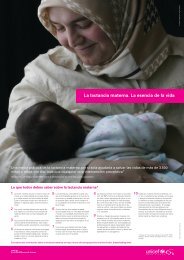SEXUAL ABUSE AND EXPLOITATION OF BOYS IN SOUTH ASIA A ...
SEXUAL ABUSE AND EXPLOITATION OF BOYS IN SOUTH ASIA A ...
SEXUAL ABUSE AND EXPLOITATION OF BOYS IN SOUTH ASIA A ...
Create successful ePaper yourself
Turn your PDF publications into a flip-book with our unique Google optimized e-Paper software.
The Sangath Centre for Child Development and Family Guidance in Goa works on child<br />
development and family behavioural and mental health. It works extensively on child sexual<br />
abuse cases, with a focus on child sexual exploitation through travel and tourism. The centre<br />
also conducts workshops on childhood and sexuality for parents, teachers and other<br />
caregivers.<br />
The Socio-Legal Aid Research and Training Centre in Kolkata conducts education<br />
programmes for boys aged 10 to 16 on sexual abuse and exploitation, HIV/AIDS and sexual<br />
health. The Centre for the Prevention and Healing of Child Sexual Abuse in Chennai<br />
conducts awareness programmes with schools and working children on sexual abuse. The<br />
organization has developed a personal safety education manual that empowers children to<br />
take part in their own protection by giving them age-appropriate information and teaching life<br />
skills.<br />
As in other countries of the region, in India the media often present incidents of sexual abuse<br />
and exploitation in a sensational manner. Stereotyping dramatic incidents of sexual violence<br />
such as gang rape is common, and the media rarely do investigative reporting of more<br />
common sexual abuse and exploitation, particularly concerning boys. In addition, some media<br />
have abused children’s rights to privacy and confidentiality by revealing identities of the<br />
victims. The fair and objective presentation of sexual abuse and exploitation in the media is a<br />
primary concern of government and international organizations. Following workshops in Goa,<br />
Ranchi, Jaipur and Puri for legal experts, police, journalists, editors and representatives from<br />
electronic media, the National Human Rights Commission, with support from UNICEF,<br />
developed a Guidebook for the Media on Sexual Violence against Children.<br />
5.4.4 Prevention through outreach to vulnerable boys<br />
The boys most vulnerable to sexual abuse and exploitation, such as working children and<br />
children living on the street, are an elusive and mobile group. They are best reached by<br />
outreach workers who contact the children at their places of work and recreation, referring<br />
them to drop-in centres that offer services such as health care, crisis response, counselling,<br />
non-formal education and life skills to help them resist sexual abuse. Such drop-in centres<br />
and similar non-institutional programmes have been established throughout India. Many noninstitutional<br />
services for vulnerable boys are conducted on an experimental, ad hoc basis, with<br />
limited integration and collaboration among service providers in a single city or geographical<br />
area.<br />
Kolkata, with a large population of boys living on the streets, was one of the first cities in<br />
India to focus on the needs of vulnerable boys. A variety of non-institutional services are<br />
available, with considerable networking and interaction among the care providers. Don Bosco<br />
Ashalayam provides high-quality vocational training for boys at its residential centres. Its<br />
outreach programme includes non-formal education and psychological support for children<br />
living on the street. Staff are posted at Howrah Railway Station to intercept children newly<br />
arrived from outlying areas and refer them to services. Loreto Day School collaborates with<br />
the City-Level Programme of Action for Street and Working Children, operated by the<br />
Kolkata Municipal Corporation. They run a teacher training institute and oversee the<br />
83










